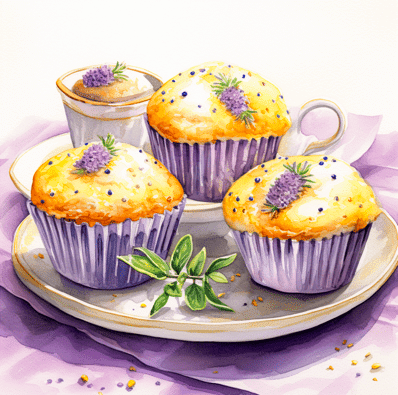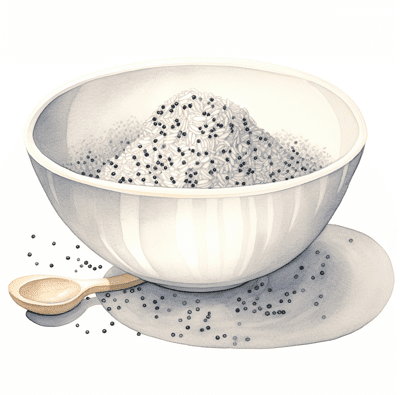
Don’t want to read the whole post?
White and black poppy seeds offer different flavour profiles and culinary applications. While white seeds have a milder taste, making them suitable for creamy dishes, black seeds boast a more pronounced nuttiness, perfect for dishes where a bolder flavour is desired.
ABOUT ME
Be beauty. Be plant-based!
As a former Registered Nurse and avid plant-muncher, I’m in love with how simple plant-based foods make it easy to be beautiful.

You’ll also love:
The Ultimate Guide to Pepitas vs Sunflower Seeds
The Nutty Truth: Munch More, Weigh Less!
White poppy seeds vs black. Amidst the hustle and bustle everyday, here you are, seeking the best for your health and well-being. That’s amazing! Let’s get to it.
White vs Black Poppy Seeds
Diving into the world of poppy seeds, and you meet with a spectrum of colours. Predominantly, there are the white and black variants. Both hail from the poppy plant, yet they have each carved their own identity.
White poppy seeds are often lighter in flavour, commonly starring in Indian cooking, offering a subtle, creamy touch to dishes.

On the other hand, black poppy seeds come with a more pronounced nutty flavour, boasting of their high oil content and an abundance of dietary fibre.
Both are nutritional powerhouses, but their unique characteristics make them shine differently in various dishes and health benefits.
The Taste Test: White Poppy Seeds vs Black Poppy Seeds
Picture this: You’re ready to take a bite of your favourite dish, and there’s a hint of something new, something nutty. What could it be? Poppy seeds! But wait, is it the white or the black variety? Their taste profiles differ as much as their colours do.
White poppy seeds offer a gentle, almost milky undertone, making them perfect for lighter, creamy dishes or those that require a more subdued flavour.
Black poppy seeds, however, are like that bold statement piece in your wardrobe – with a distinct and richer nutty taste, demanding attention in dishes where their flavour can take centre stage.

Which is better, white poppy seeds vs black?
“Better” is subjective and depends on your culinary purposes. White poppy seeds are often preferred for creamy dishes due to their subtle flavour, while black poppy seeds, with their pronounced nutty taste, are excellent for dishes where you want the seeds to stand out. It’s best to choose based on your recipe and personal preference.
Versatility in the Kitchen
Exploring the culinary versatility of these seeds is nothing short of a gastronomic adventure. Are they interchangeable, you ask? Often, yes, but with a few caveats.
In Indian cooking, for instance, white poppy seeds are the stars, seamlessly blending into gravies, lending their creamy texture to the mix.
Try this: Aloo Posto (Bengali Potatoes in Poppy Seed Sauce) at HolyCowVegan
But if you’re whipping up those delightful lemon poppy seed muffins, either variant can be your best friend, with black poppy seeds providing a more visible contrast and bolder flavour profile.
Try these: Vegan Lemon Poppy Seed Muffins at From My Bowl

From the thickening agent in poppy seed paste to the sprinkle on bread and pastries, their uses are as diverse as their flavours. The key? Experiment a little, trust your taste buds, and let these tiny power-packed seeds elevate your culinary creations.
A Sprinkle of Health Benefits
Beyond their culinary versatility, poppy seeds are like tiny magical beads bursting with health wonders. Now, consider the soulful dishes of Indian cuisine – where the use of poppy seeds is not just a matter of taste but also tradition. The seeds blend seamlessly into gravies and masalas, enhancing the overall taste of dishes, while also imparting their subtle health benefits.
Skin Health
Let’s start with skin health. Ever dreamt of skin that radiates like the morning sun? These tiny poppy seeds, available in grocery stores around the world, might just be your secret elixir. Bursting with essential fatty acids, they offer the kind of nourishment that promises soft, supple, and radiant skin. But the magic doesn’t stop there.
Heart Health
Diving deeper, poppy seeds, enriched with essential nutrients and amino acids, are silent warriors for heart health. Their high dietary fibre content not only aids in weight loss but also ensures smooth sailing for your blood pressure levels. The fatty acids present further pitch in, bolstering good cholesterol levels and ensuring your heart pulsates with all the passion and zeal of a rhythmic dance.
Immunity
But the story continues. Have you ever thought about the strength of your bones and the robustness of your immune system? Thanks to poppy seeds, bone health gets a boost, and your immune system finds a supportive friend. From salad dressings to those delightful curries, every spoonful is a step towards holistic health.
White Poppy Seeds vs Black: Storing these Tiny Gems
So you’ve fallen for the allure of poppy seeds and are stocking up? Fabulous! Now, let’s ensure these beauties stay fresh and retain their nutty flavour.
An airtight container is your best ally here. Whether you’ve chosen unwashed poppy seeds or their washed counterparts, keeping them sealed ensures they remain free from moisture, prolonging their shelf life. And if you’re wondering about those whole poppy seeds versus the broken ones, always opt for the whole. They not only store better but also offer the fullest flavour and nutritional benefits. Remember, just as you’d store a precious gem, these nutritional powerhouses deserve a little TLC to shine in all their glory.
Diverse Cousins in the Seed World
Just like every family has its collection of vibrant characters, the seed world isn’t any different. Alongside poppy seeds, there’s a rich tapestry of other seeds that dance on the culinary stage. Chia seeds, with their hydrating prowess; flax seeds, champions of omega-3; and the intriguingly dark and flavourful black sesame seeds. And let’s not forget about the zesty mustard seeds, bringing a hint of spice and drama to the mix.
Each of these seeds, including our beloved poppy seeds, tells a tale of nutrition and culinary splendour. Whether it’s the unique kidney-shaped seeds offering a twist to your dishes or the age-old allure of poppy seed tea (though approached with caution), the seed world is vast, diverse, and endlessly fascinating. Venture out, experiment, and let these tiny treasures add depth and health to your plate.
FAQ: All About Poppy Seeds
1. Do white and black poppy seeds taste the same?
No, they have distinct flavour profiles. While both have a nutty undertone, white poppy seeds are milder, and black poppy seeds boast a richer, more pronounced nuttiness.
2. Are white and black poppy seeds interchangeable?
For many culinary purposes, they can be interchangeable. However, it’s essential to consider the dish’s desired flavour and appearance. If you’re making a paste of poppy seeds for a specific cuisine, you might want to stick to the recommended type.
3. What’s the difference between white seeds and black seeds?
Beyond just the colour, white and black seeds, especially in the context of poppy seeds, differ in flavour intensity, oil content, and sometimes nutritional values. White poppy seeds are often milder in taste, whereas black seeds have a more assertive flavour.
4. What are the advantages of black seeds?
Black poppy seeds offer a rich source of dietary fibre, a pronounced nutty flavour perfect for certain dishes, and have traditionally been used for various health and culinary purposes. Their bold colour can also add a beautiful contrast in meals.
5. How should I store poppy seeds to retain their freshness?
Store your poppy seeds in an airtight container in a cool, dark place. This helps maintain their crunchy texture and vibrant flavour.
6. Where do poppy seeds come from?
Poppy seeds come from the poppy seed plant, scientifically known as Papaver somniferum. This plant serves as a food source for its seeds and has been cultivated for centuries.
7. How much poppy seed can I consume in a day?
For culinary purposes, small amounts of poppy seeds are perfectly safe. However, it’s wise to avoid consuming large amounts of poppy seeds in a short time due to potential compounds present in the seeds.
8. What are some of the various uses of poppy seeds in the kitchen?
Poppy seeds are versatile! They can be sprinkled on bread, incorporated into pastries, blended into a paste for certain dishes, or even pressed for their oil. Their unique taste and texture can elevate many dishes.
Whether it’s for flavour, health, or the sheer joy of experimentation, seeds offer a world of possibility. And in this universe of tiny powerhouses, poppy seeds, with their diverse colours and properties, shine brightly, waiting for you to unveil their secrets.